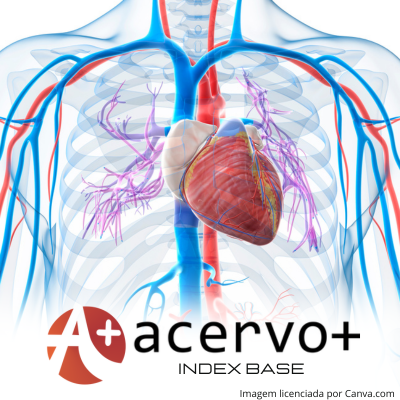Adaptações cardíacas e desempenho no sistema cardiovascular de atletas submetidos ao treinamento de endurance
##plugins.themes.bootstrap3.article.main##
Resumo
Objetivo: Analisar os efeitos do treinamento de endurance no sistema cardiovascular de atletas, com ênfase nas adaptações cardíacas e nas alterações no desempenho cardíaco resultantes dessa modalidade de exercício. Métodos: Foi conduzida uma revisão integrativa, com busca nas bases PubMed, Scopus, Web of Science e BVS, considerando publicações entre 2020 e 2025. Foram incluídos estudos primários que abordassem os efeitos do treinamento de endurance sobre a função cardíaca, biomarcadores e remodelamento cardíaco em atletas. Resultados: Os achados demonstraram que o treinamento de endurance promove adaptações cardíacas majoritariamente fisiológicas, como aumento dos volumes ventriculares, aprimoramento da função diastólica e melhor desempenho autonômico. Entretanto, sob condições extremas, foram observadas alterações transitórias na função ventricular e elevação de biomarcadores, principalmente no ventrículo direito. Atletas idosos e aqueles com fibrose prévia apresentaram maior risco de disfunção. Fatores ambientais e protocolos de alta intensidade também impactaram agudamente a função cardíaca. Considerações finais: O treinamento de endurance, quando adequadamente monitorado, é benéfico para a saúde cardiovascular. Contudo, deve ser individualizado, especialmente em atletas mais velhos e em contextos de alta exigência, a fim de mitigar possíveis riscos cardíacos.
##plugins.themes.bootstrap3.article.details##
Copyright © | Todos os direitos reservados.
A revista detém os direitos autorais exclusivos de publicação deste artigo nos termos da lei 9610/98.
Reprodução parcial
É livre o uso de partes do texto, figuras e questionário do artigo, sendo obrigatória a citação dos autores e revista.
Reprodução total
É expressamente proibida, devendo ser autorizada pela revista.
Referências
2. BIZJAK DA, et al. Running for Your Life: Metabolic Effects of a 160.9/230 km Non‑Stop Ultramarathon Race on Body Composition, Inflammation, Heart Function, and Nutritional Parameters. Metabolites, 2022; 12(11): 1138.
3. CLIMSTEIN M, et al. Electrocardiographic Assessment of National‑Level Triathletes: Sinus Bradycardia and Other Electrocardiographic Abnormalities. Sports, 2025; 13(1): 25.
4. COATES AM, et al. Alterations in Cardiac Function Following Endurance Exercise Are Not Duration Dependent. Frontiers in Physiology, 2020; 11: 581797.
5. DOMA K, et al. Training Considerations for Optimising Endurance Development: An Alternate Concurrent Training Perspective. Sports Medicine (Auckland, N.Z.), 2019; 49(5): 669–682.
6. DONALDSON JA, et al. Olympic distance duathlon and cardiac performance in highly‑trained triathletes. Physiological Reports, 2024; 12: e70154.
7. EZE-NLIAM C, et al. Endurance exercise in seniors: Tonic, toxin or neither? Clinical Physiology and Functional Imaging, 2020; 40(5): 320–327.
8. FAIVRE‑RAMPANT V, et al. Cardiac electrical and functional activity following an outdoor cold‑water swimming event. Journal of Thermal Biology, 2024; 125: 103996.
9. ERIKSSON LMJ, et al. Evidence of Left Ventricular Cardiac Remodeling After 6 Weeks of Sprint Interval Training. Scandinavian Journal of Medicine & Science in Sports, 2024; 34: e70007.
10. KALETA‑DUSS AM, et al. Myocardial Injury and Overload among Amateur Marathoners as Indicated by Changes in Concentrations of Cardiovascular Biomarkers. International Journal of Environmental Research and Public Health, 2020; 17: 6191.
11. KLEINNIBBELINK G, et al. Acute exercise-induced changes in cardiac function relates to right ventricular remodeling following 12‑week hypoxic exercise training. Journal of Applied Physiology, 2021; 131: 511–519.
12. KUSY K, et al. Aging Athlete’s Heart: An Echocardiographic Evaluation of Competitive Sprint- versus Endurance-Trained Master Athletes. Journal of the American Society of Echocardiography, 2021; 34(11): e70007.
13. LAMAA N, et al. Is Endurance Training Harmful to Older Athletes in the Long Run? An Interesting Case of Exercise-Induced Ventricular Tachycardia. Cureus, 2021; 13(11): e19665.
14. PAGOURELIAS ED, et al. Impact of a 246 Km ultra‑marathon running race on heart: Insights from advanced deformation analysis. European Journal of Sport Science, 2022; 22(8): 1287-1295.
15. PRADA EO, et al. Cardiovascular adaptive response to training in elite athletes: comparison between endurance and non‑endurance athletes. Medicina (B. Aires). 2024;84(3):415‑425
16. SOUZA MT, et al. Revisão integrativa: o que é e como fazer. Einstein (São Paulo), 2010; 8(1):102–106.
17. SUN Y, JIANG H. Effects of aerobic gymnastics on heart rate variability and physical performance in male college students. Revista Brasileira de Medicina do Esporte, 2023; 29: e2022_0488.
18. SUN Z, JIANG P. Effects of aerobic exercise on heart rate variability and physical performance in young adults: A six‑week study. Journal of Sports Sciences, 2023; 41(12): 1398‑1404.
19. SZABÓ D, et al. Influencing factors of cardiac adaptation in adolescent athletes. International Journal of Sports Medicine, 2021; 42(13): 1209–1221.
20. TAHIR E, et al. Acute impact of an endurance race on cardiac function and biomarkers of myocardial injury in triathletes with and without myocardial fibrosis. Eur J Prev Cardiol, 2020;27(1):94–104.
21. TAO C. Benefits of Running on Cardiac Protection and the Culture of Exercise Health Awareness. Revista Brasileira de Medicina do Esporte, 2023; 29: e2022_0168.
22. TARUMI T, et al. Proximal Aortic Compliance in Young Male Endurance Athletes: An MRI Study. Medicine & Science in Sports & Exercise, 2021; 53(3):543‑550.
23. HUGHES DC, et al. Adaptations to endurance and strength training. Cold Spring Harbor Perspectives in Medicine, 2018; 8(6): a029769.
24. RUEGSEGGER GN, BOOTH FW. Health Benefits of Exercise. Cold Spring Harbor Perspectives in Medicine, 2018; 8(7): a029694.

